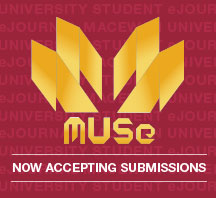From Science as Solution to Science as Suspect:
Science Fiction and the Canonical Decline of Technoidealism
DOI:
https://doi.org/10.31542/muse.v5i1.2022Abstract
Edified in Isaac Asimov's canonical Foundations trilogy, the exemplification of science as a panacea to human quandaries--herein referred to as technoidealism--is a central element of the 1950's science-fiction canon. Faced with a period of upheaval and a wave of new science fictions authors, this article explores the manner in which this assumption is modified, complicated, and popularly rejected. Drawing on the work of authors such as Isaac Asimov, Frank Herbert, Philip K. Dick, Jeff Somers, and Iain Reid, the technoidealist impulse serves to highlight the utopian current undergirding Asimov's work and the genre's complication of the human-science relationship. In drifting from its nascent futurist idealism, the literary endorsement of "science as solution" has veered toward "science as suspect" through a complication and reproval of the technoidealist assumption.References
Downloads
Published
Issue
Section
License
Copyright (c) 2021 Nathan Fuhrer

This work is licensed under a Creative Commons Attribution-NonCommercial 4.0 International License.
By publishing works in MUSe, authors and creators retain copyright under a Creative Commons Attribution NonCommercial (CC BY-NC) license, which allows others to share these works for non-commercial purposes as long as credit is given. The MUSe Editorial Board reserves the right to make copy-editing changes to works prior to publication to ensure they conform to the publication's style and quality standards. The Editorial Board also reserves the right to archive published submissions in MacEwan University's institutional repository, RO@M.



